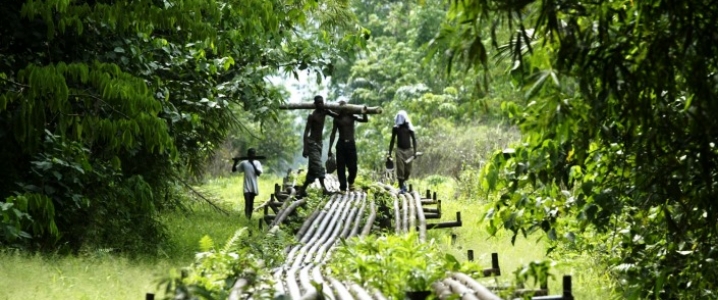Niger Delta State Looks To Break Free From Oil

Bayelsa, a state in the Niger Delta region of Nigeria, will search for non-oil natural resources to diversify away from its main commodity—oil. This is what the state’s new commissioner in the Ministry of Mineral Resources said after taking office.
Markson Fefegha added that there are plans in place to buy geological survey equipment to be used for mapping the province and its mineral resources. Funding will hopefully come from international mineral resources companies, but the Bayelsa government is also considering directly approaching the World Bank, the African Development Bank, and China’s Exim Bank.
According to commissioner Fefegha, the discovery and exploitation of new mineral resources will boost Bayelsa’s monthly internal revenue to US$14 million (5 billion naira), from about US$5.56 million (2 billion naira) currently.
These plans, however, do not aim to replace oil revenues, but rather to complement them. Admitting that Bayelsa is dependent on the income it receives from oil production, Fefegha said the state government will soon begin constructing module refineries to create new jobs.
The module refinery idea was proposed by the federal government as a solution to oil theft and illegal refineries in the Niger Delta. Wood Mackenzie estimates that almost a third of the crude oil that flows along pipelines in the Delta ends up in the hands of thieves. Thieves, who often cause pipeline leaks like the one that led to the closure of the 60,000-bpd Agbada flow station in June.
For a long time, the federal Nigerian government swung between the summary destruction of the illegal refineries in the Delta that process the stolen crude and an initiative to legalize them and organize them into a modular refinery consortium.
Just last year, the army destroyed 181 illegal refineries and confiscated oil and diesel worth about US$1.3 billion. Now, Abuja has negotiated the legalization of the illicit processing facilities with Niger Delta communities, which could reduce the thefts.
Related News
Related News

- Keystone Oil Pipeline Resumes Operations After Temporary Shutdown
- Biden Administration Buys Oil for Emergency Reserve Above Target Price
- Freeport LNG Plant Runs Near Zero Consumption for Fifth Day
- Enbridge to Invest $500 Million in Pipeline Assets, Including Expansion of 850-Mile Gray Oak Pipeline
- Williams Delays Louisiana Pipeline Project Amid Dispute with Competitor Energy Transfer
- Evacuation Technologies to Reduce Methane Releases During Pigging
- Editor’s Notebook: Nord Stream’s $20 Billion Question
- Enbridge Receives Approval to Begin Service on Louisiana Venice Gas Pipeline Project
- Russian LNG Unfazed By U.S. Sanctions
- Biden Administration Buys Oil for Emergency Reserve Above Target Price




Comments